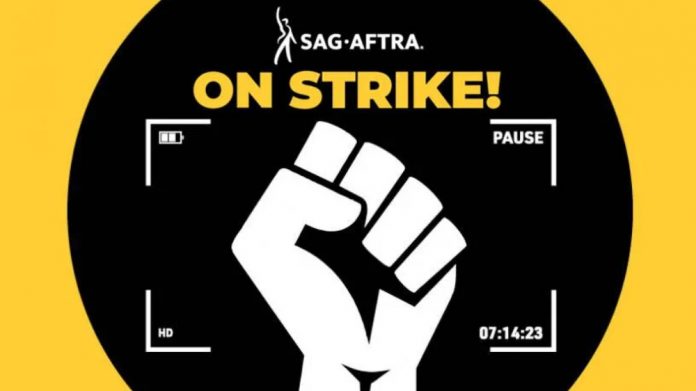Above the Line has been extremely disappointed with the progress of negotiations between the AMPTP and both the WGA and SAG-AFTRA, as it’s high past time for Hollywood’s double strike to end.
That feeling is shared by hundreds of thousands if not millions of people, not just within the industry, but across the entire city of Los Angeles. After all, this strike doesn’t just affect actors and writers, but restaurant owners, nannies, and even entertainment journalists, not to mention all the hair and makeup artists, production designers, and visual effects wizards whose stories have been chronicled all summer long on our sister site, Below the Line.
People from all walks of Hollywood life have seen work dry up this summer, and studios have even been forced to lay off their own staffers, so the rank-and-file end up paying for the poor business decisions of the millionaire execs populating C-suites across town.
And for what? To save a few bucks — in the larger scheme of things — and look more appealing to investors on Wall Street whom the Hollywood CEOs will never meet or have to look in the eye as they drop off their kids at school.
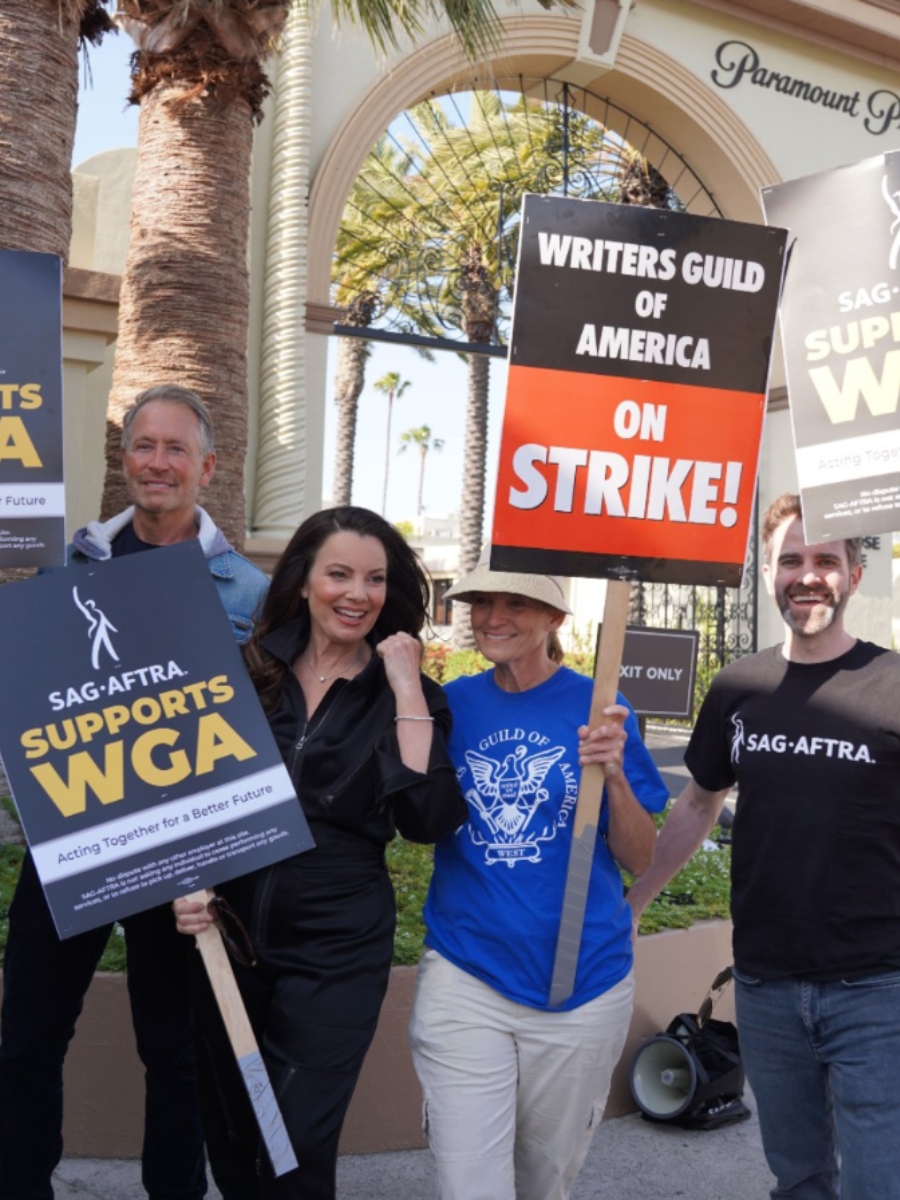
In an effort to get a better understanding of what’s taking so long and why, Above the Line reached out to a handful of well-positioned individuals who might offer their insight, and while most were reluctant to discuss the strikes, one person on SAG-AFTRA’s Negotiating Committee took us up on our offer so long as they could remain anonymous.
In consultation with ATL‘s publisher, I decided to give this candid individual a platform, and though it has been lightly edited to protect their identity, we felt it was necessary to share this interview, if only because it wasn’t arranged by a publicist or placed by some corporate strategist. One of the major themes I’ve discovered during this strike is that the town doesn’t feel like it can trust the increasingly corporate trades to have their best interests, which is a shame, but that’s another story for a different day.
Today, we’re focused on the issues of the SAG-AFTRA strike, including those where the guild might actually be willing to bend a little. For example, after talking with many SAG-AFTRA members over the past month, it sounds like numbers are negotiable to the guild, not big-picture ideas — generally speaking.
That means that the guild won’t be conceding any points on AI. The guild simply can’t give in regarding that issue as it’s too important, seeing as how it affects the health and future of the entire profession. SAG-AFTRA is working closely with multiple AI experts who have warned the guild that any kind of compromise on this issue could have severe consequences for actors. However, it’s extremely rare, when two sides are negotiating a contract, that one side gets everything it wants, so the guild’s ask for a 2 percent revenue share — or perhaps its stance on pension caps — is where you could end up seeing SAG-AFTRA make concessions to the AMPTP. What’s become clear at this point is that both sides will have to give in on something.
As the strike continues to drag on into Labor Day weekend, it’s important to remember all the labor that goes into film and television production. Lives and careers are at stake here, so pay attention to what the actor below has to say, and not just because they’re one of the 43 people on the guild’s negotiating committee, but because all the voices that have been affected by the strike deserve to be heard.
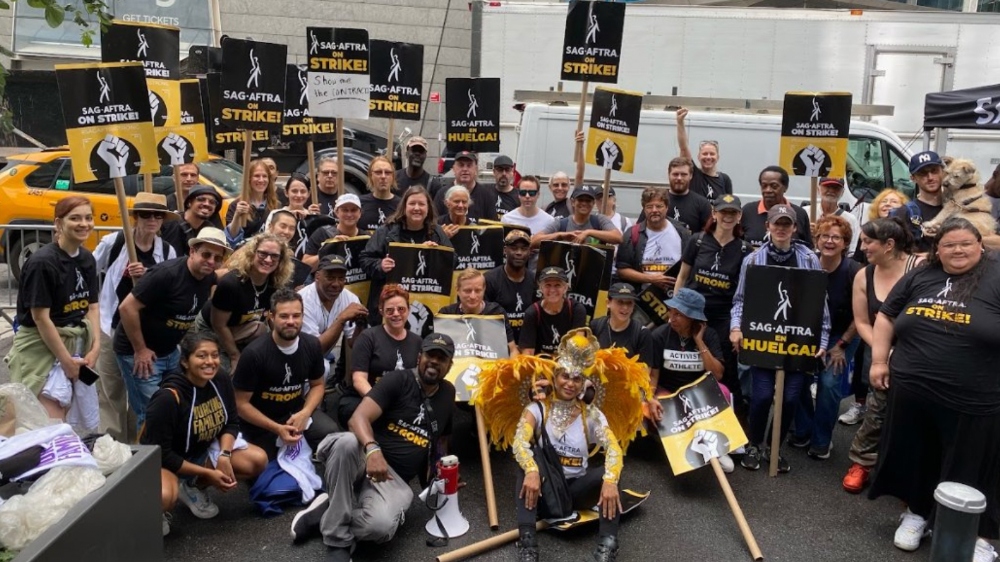
Above the Line: Let’s start with the big question — when do you think the strike will end?
I kinda thought, or at least hoped, that it was going to be over by [Labor Day weekend] — not necessarily ratified, but drafted up in principle. But the bottom line is, I have no idea. I didn’t think that they’d be willing to shine [punt] all of linear television’s fall season and all of the Christmas movies and the Oscars. Right now, it looks like what I call Track 2, is the track that they’re on and they’re gonna choose to do just that.
I’d say that if there’s not something that happens [that’s] significant with the writers today [Wednesday] or tomorrow — certainly probably not on Friday — and we get into next week, if the writers can’t get something papered up by next Friday, the 8th, then I don’t see how they would think they would paper us up by the 15th, and my personal belief is that the 15th is kind of the drop-deadline for what I would call Track 1, and if they go past the 15th, then whether it becomes true or not, it starts to appear as if they’re looking to January… to me, purely in my opinion. That’s not based on anything official from inside the negotiating room at all.
ATL: And I know you’re talking about SAG, but do you think they would let both strikes go to January?
Well, logically, why not? I think that… I mean, logic dictates that they’d have to paper up the writers first, for a couple of reasons. One, because people tend to write before [actors] act, and two, while we obviously have some Venn diagram crossover in some of our minutiae, and also macro [issues] — from AI to a certain number of percentages on streaming residual formula — the truth of the matter is that our contract is far more complex than the WGA.
So, from the outside looking in, one thing naturally precedes the other based on its actual purpose, plus the WGA’s contract can be easier to resolve in terms of the minutiae, it just makes sense that [they’d paper the writers first]. And there shouldn’t be much of a gap between the two of us, but I continue to think that the recent reporting circling about [with them] talking to the writers and then coming to us instead without a WGA deal yet… doesn’t really make any sense to me personally at this point. Not at Week 7 for us and Day 120 for them. It makes no sense, not that I think the AMPTP cares about making sense anyway, but it doesn’t make a lot of sense to me.
ATL: OK, so the writers make a deal, and then how long do you think it would be before SAG makes a deal after that, whenever it may come?
Make a deal? I think we would have to start with how long it would take them to make a phone call to us? Do they want to try and squeeze us now and let us sit there and wonder what the hell is going on, like they did during the 12-day extension when they basically just fucked off for six days of it and did nothing? I don’t know. But I would not think that they’re going to go ahead and actually be able to arrive at the deal that we all know that the Writers Guild has to make.
I can’t see them tarrying for too long in trying to get us back in the room. I can’t see it. But when that deal would be made? I mean, we’ve been clear publicly that we’re talking about it being a Grand Canyon that we’re apart, Jeff. I mean, we’re not close on things that aren’t even discussed in the media because they’re too complex to discuss. We can’t even discuss the mechanical self-tape casting issue that we have in our proposal because it’s too convoluted for the general public to understand, but that’s a huge, huge point.
And we haven’t even really heard much in the media about AVOD (Ad-supported Video on Demand) stuff because the other thing is that AI kind of rules the day, and it does, from our chair. It does. And from the AMPTP’s chair, and you know as well as anyone else, [they] do not want to be transparent or expose their subscription accounting and what that could mean to them. That’s really the albatross around their neck, and then [it’s] AI from our side.
So that’s why these other things aren’t being discussed, but I’ve gotta tell ya, Jeff, this is not my first rodeo. This is a very sharp committee in this negotiation cycle. It’s kind of a harmonic convergence of well-seasoned, well-diversified, intelligent people who have taken the time to really understand this contract, and we’re just a long way apart, hence why we’re on strike.
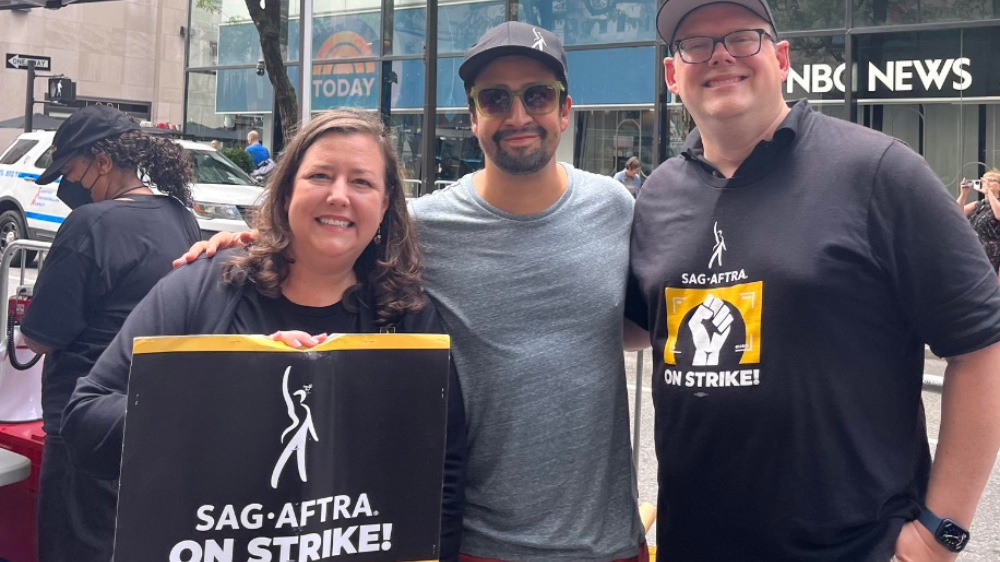
ATL: Before we get into those issues you brought up, let me ask you, how do you feel the media has done in covering the strikes and the various issues? Do you feel the coverage has been slanted toward the AMPTP? What are your thoughts?
Yeah, I’ll go 60/40 with you — a 60/40 slant [for the] AMPTP. I mean, they’re owned by ‘em. These things don’t upset me like they might upset other people or the general public or other actors. I come from humble beginnings, so wealthy people playing horseshit games is not lost on me, so the idea that somebody might attempt to lord over a news outlet or journalists with the threat of pulling advertising dollars, or whatever, sure, it can lead to a little bit of a slant. But it’s easy for actors who aren’t necessarily stars to only see the negative slant in some of the media, but I don’t see it as being 90/10 [in favor of] the AMPTP. I think it’s been a bit slanted, but that’s not a shock to me. At all.
ATL: Is there an outlet that you trust or distrust more than others?
I know a few Hollywood media journalists and it’s now a common running joke out on the picket line with a particular individual who works at Deadline, that has been coined as, “No, no, she’s one of the good Deadline people,” [laughs], so I think that kind of phrasing speaks volumes, and she knows it, you know? She knows it. But that’s one of those things that’s so subjective and so open for controversy — it’s all pure speculation.
ATL: OK, so you mentioned the self-tape proposals and AVOD stuff not really being covered by the media, so what is it about those issues that you want to get out there in a way that people can understand it?
I think, for the most part, that with regard to the self-tape [issue], this is a mechanical, structural thing, right? This isn’t really [a problem] based on money. It’s just a really bad harmonic convergence of COVID. It’s not like self-tapes and recording have not existed before this negotiation. People started recording auditions in [their own] rooms at the turn of the century, but while self-tapes were certainly becoming more and more prevalent, COVID kind of cemented them as a necessary health risk reason why we even — us, the performers — did it as a matter of safety, and after 3.5 years, that’s now seemingly been co-opted into a clear belief system by the AMPTP ’cause it saves them dollars. It saves them administrative time. And again, they’ve put all the work on us. And the people at the AMPTP don’t know what this shit takes to get done. Three years and change, they just figure, at this point, that we’re OK with it.
See, the AMPTP works a lot from the basis of union member complaints. They say, “No one complained from 2020-2023.” Well, no shit. There’s a reason — COVID. “Well, you guys seem to have accepted it, so what’s the problem?” Well, here’s the problem. Look at the damn proposal. “‘Well, you guys are OK, you’re fine.” And when you even suggest an option for an in-person audition, it’s as if we’re speaking Latin. It’s like, “What?” So the cognitive dissonance has gone way up on how crucial this issue is to us.
Listen, am I someone who appreciates and likes being able to be out of town and not have to miss out on something, yes. But I’m also really good in a room. A lot of us who are a little bit older, it’s a hybrid for us. I like the flexibility, but I like being in the room. The work scope of a self-tape today could almost be defined as a screen test in the “old days,” which is something in our CBA (Collective Bargaining Agreement) you have to be paid for. But I’ve done [a lot of] guest star [roles]. I’m good in a room. Most actors tend to like the flexibility of self-tape, but a lot of us also miss being in the room. They just don’t seem to want to even consider it after the last 3.5 years.
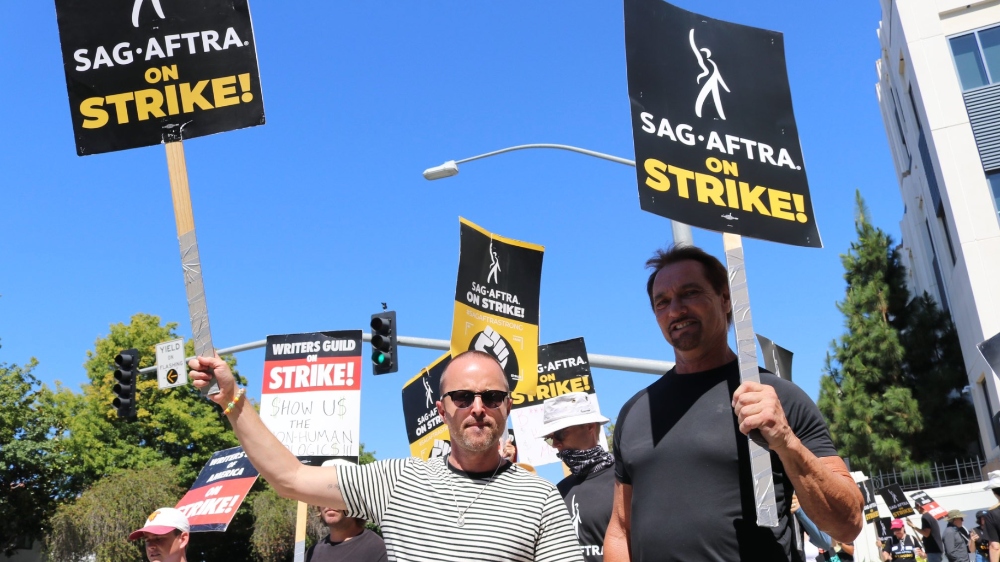
ATL: Is there one studio, or one executive, who’s sort of making things difficult for everyone else? I mean, many are calling this The Netflix Strike…
I can’t really speak to that and don’t know how the committee even sees that, Jeff. I don’t know that we would view the people we’re across the table from in that way, but I think most of the people in Hollywood who are close to this issue feel, perhaps, that there’s a very strong likelihood that the leaders of this conversation, in some ways, would be Netflix. I don’t think that that’s a unique or groundbreaking thought, at all. From just my own personal point of view — not the committee’s as a whole at all — it makes me wonder, “Why hasn’t someone told Netflix to go fuck themselves,” and just peeled off [from the AMPTP] and tried to make their own deal? I think that’s a logical and fair question, honestly. [Barry Diller has also said that the studios split off from Netflix and Amazon].
That doesn’t mean that anyone’s going to do it, and it doesn’t mean that they don’t feel strongly about standing together themselves on the other side of the table, but I think that is one of the things that committee members might be, from our chair, much more curious about. Are the linear television companies really just going to punt the fall TV season? How long are all the other outlets just going to punt all of the individual Christmas movies that could be released?
How much more will theatrical distribution entities punt on having nothing to release leading up to Oscar time? That’s much more how I look at it as a committee member, in terms of that question. This doesn’t really make any sense if you’re being led by the nose by an entity whose business model is distinctly different than some of the others. Sometimes it doesn’t make any sense to me.
ATL: If Netflix is the rumored villain, then who is the rumored adult in the room on the AMPTP side? Is there someone who’s actually providing the AMPTP with some real leadership?
[laughs] Well, I imagine that Carol Lombardini feels she’s giving the AMPTP fine leadership. And it isn’t as if we’re picketing in front of her house yet, which is a conversation that could be had [laughs], but my personal guess is that she thinks she’s providing fine leadership. I imagine that Disney and HBO Max also feel fine about how they present themselves and their agenda in the room, which is logical, but again, that’s all speculative.
Apple and Amazon are different animals because they have much more robust, healthier other forms of revenue streams. I don’t think it means they don’t care, but it does sort of lend itself to why they would maybe follow along or remain slightly in the background when this is not their entire business model. Paramount+, you start getting into areas where it’s really strange, and I’m just a little more surprised… but to identify an adult in the room is far too subjective. It makes sense to listen to Disney, for a lot of reasons. Because they’re Disney. Who does the media mostly reference or talk about as Mom and Dad? Netflix and Disney, with Warner Bros. Discovery playing the influential step-dad or step-mom, right? So them as a triad isn’t really new news. But yet there are people sitting at this table who have either similar or completely different needs.
And so I think from my chair, as a committee member, to answer your question, I’m just a little more surprised that… [think of] the TV show Survivor, and how two or three people create this little [group] and went to Mom and Dad and said, “We need to talk to you guys about some shit.” And maybe that’s happening, but I’m certainly not aware of it, nor do we, as a committee, really spend official time trying to guess who “the adult in the room” is.
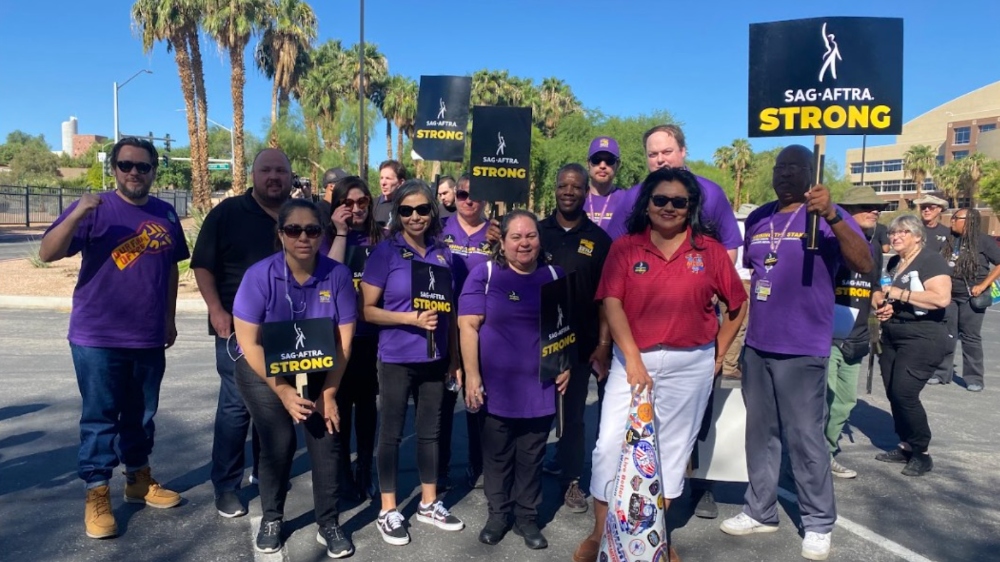
ATL: How much longer can the actors hang on? I know people are feeling it and burning through savings, and taking side gigs, which I guess comes with the territory as an actor. But how much longer can folks actually hang on before they decide, alright, let’s just take whatever they’re offering now.
Yeah, again, this is my personal opinion, but I still think that most of this is about the fact that we have revenue sharing on the table, which would involve some transparency, which is probably going to scare the shit out of these companies in terms of what their shareholders may find out. I still think that’s a huge part of this, but if we drill it down to just that, I think the AMPTP companies have made a massive miscalculation, both with us and with the writers.
Because the people who are not stars, in both camps — and there are star writers, as we know — we have all found a way to make a living for a long time. Whatever ways you want to do it, whether it’s doing online reviews or however you pad your pocket, whether it’s petsitting or dogsitting or you gave up your apartment and now you just housesit because that’s easy to do, or you segmented your place off and you do Airbnb, I don’t give a shit what model you came up with, these guys have been killing us for 12 years, Jeff. For four cycles, since 2011.
I laughed to myself, in the room, at the discrepancy in the size of our two proposal packages, and I was like, “Well, sure. It’s because they’ve taken everything else! What the fuck else can they ask for?” But in that period of time, also, people have made adjustments, and so when you have celebrities finally out on the line because of AI, and granted, yes, they’re coming for me too, but they’re coming for the celebs first, they’re not coming for me first. I’m just a longtime, journeyman working actor at this moment, so I don’t know that there’s actually a line of demarcation where we would ever, at this point, cave to, “Well, it’s been long enough.”
I don’t think, with the 98 percent pre-strike authorization from nearly 50 percent of our entire membership and the absolute ire and frustration and anger in our community over the disrespect of where the self-tape mechanism is and 41 years of pension caps, basically the AVOD formula structure is the same as [what] fucked up cable back in the ’90s, and we can’t fuck it up this time because the second this contract is over, the AVOD budgets are likely to go through the roof. Just go look at all of the articles in the last 90 days on F.A.S.T. (free ad-supported television). That’s why they gave the damn DGA 70 percent on SVOD. I mean, the AMPTP is a lot of things, Jeff, but stupid ain’t one of them.
They gave them this big, shiny bauble to make them all feel warm and fuzzy, and that’s because they’re gonna be putting a lot more money into AVOD budgets, because it’s just going to be what television is becoming. You know that. We all know that. And so, with that being the case, when you step away from negotiations and get away from the entire specifics of it and just say. As Fran [Drescher] said, ‘You guys fucked up the model.’
Digital technology is basically demanding that we slowly move away from linear television, and in my opinion, there are basically going to be 4-5 landing spots that are what I might coin streamer networks, and they’re collection entities where the AMPTP companies release content on their own platforms, and Westworld (for example) ends after four seasons having served its purpose, and then they just license it over to YouTube TV. I mean, that’s where we’re headed, to me, so that AVOD formula/terms being brought up to SVOD standards is kind of important.
You can say that it’s about the money, but we know that it’s absolutely, unequivocally, inherently necessary. The erosion of linear television is one of the reasons why it’s so much harder for working actors who aren’t necessarily stars to make a living anymore — because network TV re-runs are gone. There are no re-runs anymore on network television, which is where we would get 100 percent of our residual check, right? On the first rerun. That’s gone and it’s been gone, because it airs once and it gets “moved over” to a streaming platform where our current CBA [Collective Bargaining Agreement] streaming residual terms are, well, really sub-standard, so we have to severely alter that in AVOD, and do so now. And do you think they really want to do all that? No. [laughs]
And that’s what I’ve been trying to tell people out on the line and in all the interviews I’ve done because it’s easier for the general public to understand. Basically, 100 percent on the first-run domestic rerun of a TV show from the fall television season or the early half of the new year being rerun in the summertime? At 100 percent on the first rerun? That model is gone. And that model is costing people like me making a living. You have to recreate that in the world we’ve been living in for 10-15 years, and now accepting that AVOD is going to eventually become financially equal or maybe even surpass SVOD (Subscription Video on Demand). And that’s an example of a formula that they don’t want to rewrite, because it must be reformulated — now. And they don’t wanna do it. So that and the self-tapes are huge, huge issues. They’re really a big deal.
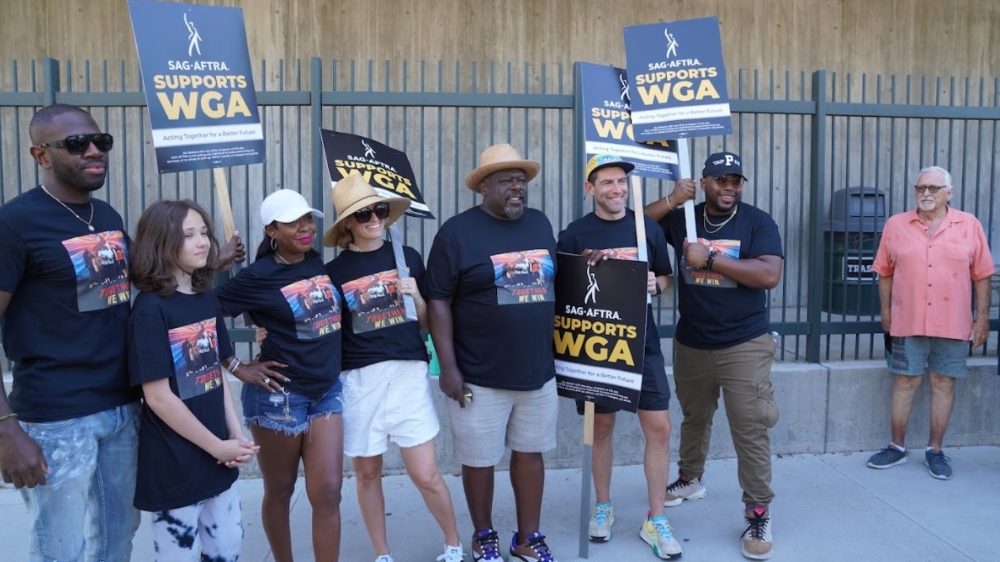
ATL: On the flip side, what are the issues that it seems like the guild is willing to concede on? I mean, this is a negotiation, after all, and in a negotiation, it’s rare that one party would get everything they’re asking for, so what is an issue SAG might actually give in on if they had to in order to put an end to this strike?
That’s a very dicey question for a committee member, as I can’t discuss negotiation strategy or even my own thoughts on a specific negotiation strategy.
ATL: How do you personally think Duncan Crabtree-Ireland and Fran Drescher have been doing from your perspective on the inside?
Outstanding. I don’t know if you’re a sports person or not, but if you are, then why do the Mets suck this year with all the money they’ve spent on talent? Why have the Dodgers not won more championships with the money that they’ve spent? Because there’s this thing called chemistry in life that matters, and there’s chemistry makeup in rosters that matters. Well, we have a roster just like a baseball team or a football team, and this roster’s chemistry has never been in this room together, as one group, ever before. And some of the new faces who are in that room make a huge difference, but the number one difference, Jeff, was the fact that Fran stood up and said “Fuck this, the jig is up.” That’s what coalesced this group the most, in my opinion anyway.
And obviously, there are several people who know each other very well, from both sides of the factions in SAG-AFTRA, who have a tough history between each other, but when your leader stands up and says to the other side, upfront, “You guys fucked this up and we’re not doing it. The jig is up.” That’s her phrase, right? That took this room into a different place of chemistry and that’s why I’m sharing with you that when you ask, “When is it going to be over?” and “What are we going to give on?” it’s hard to say with this committee at this moment in SAG-AFTRA contract history. This group is pretty solidified and together on what it is we’re standing behind on in this strike. And I think, or at least feel, that most of my fellow committee members would say that. That’s something where I think 42 out of 43 committee members would state it or characterize it fairly similarly, as many already have publicly in various interviews. Because Fran’s attitude has been, “No, we’re done. You guys are gonna have to come to us.”
ATL: And if this thing does actually drag on to January, do you think that’s the absolute latest it will go, and it will be over early next year?
Yeah, I would be stunned to see it go past January, in terms of going back to work, but I don’t even say that from our chair, I say that from their chair. I think there’s another miscalculation, and again, this is completely my individual opinion as a committee member, but I think they’ve also made another miscalculation because they live on a different planet. They live in a place on a private jet above the clouds where they don’t even see the ground. If you fly alone enough above the clouds and you never have to go through airport security, you forget that it even exists.
I’m sure you know some multi-millionaires and high-value people. I do. I’ve been around them and spent time around them, and it’s like a different life. It’s not even the same conversation. And I think one of the biggest miscalculations they have made is that this country has a lot of Janet Jackson in ’em. [singing] “What have you done for me lately? What have you made for me lately?”
I have friends all over this f-ing country, I have friends everywhere, who have called me, texted me, sent me emails and private messages saying, “What the fuck am I going to watch?” Between COVID and now… I mean, they’ve seen everything, and I’ve personally done foreign dubbing, and some of the shitty foreign TV shows that they want to try and bring over, I’ve got bad news for them — Americans like to buy new shit. Even when they don’t need it, or almost when they can’t afford it. And I think they’ve made a massive miscalculation in terms of what they think can repatriate, or slap some lipstick on a pig, and continue to try and sell and keep their subscriptions up, I think they’ve made a miscalculation. Americans like new stuff, and they’re running out of stuff.
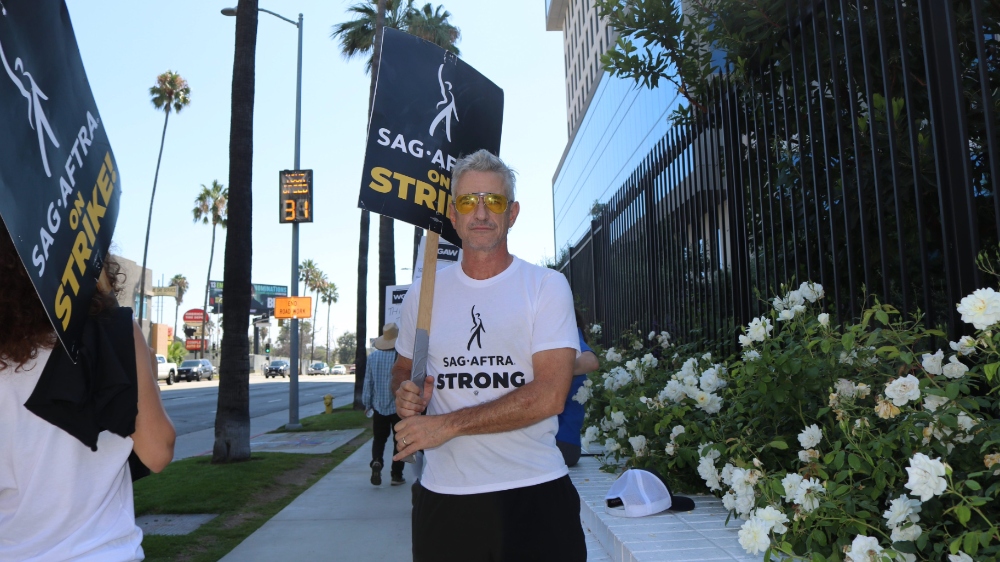
ATL: And when this is over, and all the deals are signed and people go back to work, is it going to be the same industry, or has the AMPTP done irreparable damage to this town and this industry?
I don’t know about irreparable damage but I will say, and again, this is just my individual opinion, but there is going to have to be, I think, a distinct contraction in this profession, without question. A lot of what’s gone on for the last 12-15 years — as I can even go back to ’08, honestly — [is that] they’ve basically been a new business run amok that has had no risk concern because they’ve done it off all the money they’ve made or saved from the sub-standard contracts we have provided to them, and they have not had to concern themselves, almost at all, in my opinion, with their budgets and their bottom lines, etc.
The result of that ideology is that it has expanded certain locals and unions everywhere, and what it’s done is, it has helped — and you could say it’s helped, but you could also say it has not — perhaps making a lot of people think they have the skill set to work in this industry long-term when they actually don’t, and I think there’s going to be a lot of contracting of writers who aren’t that good and actors who aren’t that good, and a lot of natural contraction on their end in terms of overhead exposure. How much do they want to continue to expose themselves with what their budgets are? Because they’re not gonna able to do that anymore off of our backs!
And there is a point where you can keep on trying to lay people off, but you can only lay so many people off for so long. So the bottom line with the industry is, I don’t think it’s irreparable, but [there will be] a reshaping of it. Fran’s not wrong — this has been a new business model for a long time, and the jig is up, and the roosters have come home to roost, right? And so here we are.
I just think that there’s going to be a 20 to 33 percent contraction of production and therefore jobs, and I think a lot of it is that they’ve gotten away with growing this sort of massive profession that this is now, with the digital exhibition release platforms, that they’re gonna have to pull the reins in and pulling those reins in is going to include everyone. It’s gonna have to include the CEOs, and it’s going to have to include shareholder expectations, guarantees, and dividends, and don’t get me started on stock buybacks and all that other shit because that goes off a rail. So the bottom line is, I don’t think it’s irreparable, but I think it’s going to be a bucket of cold water in the face. I do.
ATL: Is there anything you wanted to talk about that I didn’t get a chance to ask you about?
It is genuinely time for America to understand that 95 percent of this community [doesn’t] make a lot of money, and 95 percent of all those people you see [who] are not the stars you’re staring at are part of this product just as much as one egg or two eggs are part of a huge cake, and you can’t make the same cake without ’em. And the idea now that America is finally starting to realize, “Oh shit, yeah, we’ve gotta make sure we still have some eggs, too.’
I just invented that metaphor, and I’m doing it to [communicate the idea] that even though you don’t see it as much, you know it’s in the mix and it has value, and I think that America is finally starting to wake up to the fact that those 95 percent to 98 percent of our profession are incredibly financially vulnerable, and that’s what we’re fighting for.


